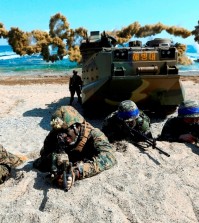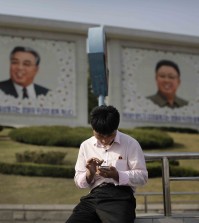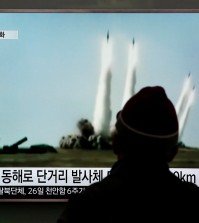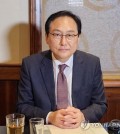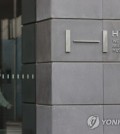- California Assembly OKs highest minimum wage in nation
- S. Korea unveils first graphic cigarette warnings
- US joins with South Korea, Japan in bid to deter North Korea
- LPGA golfer Chun In-gee finally back in action
- S. Korea won’t be top seed in final World Cup qualification round
- US men’s soccer misses 2nd straight Olympics
- US back on track in qualifying with 4-0 win over Guatemala
- High-intensity workout injuries spawn cottage industry
- CDC expands range of Zika mosquitoes into parts of Northeast
- Who knew? ‘The Walking Dead’ is helping families connect
US vows to cut off N. Korea from international financial system
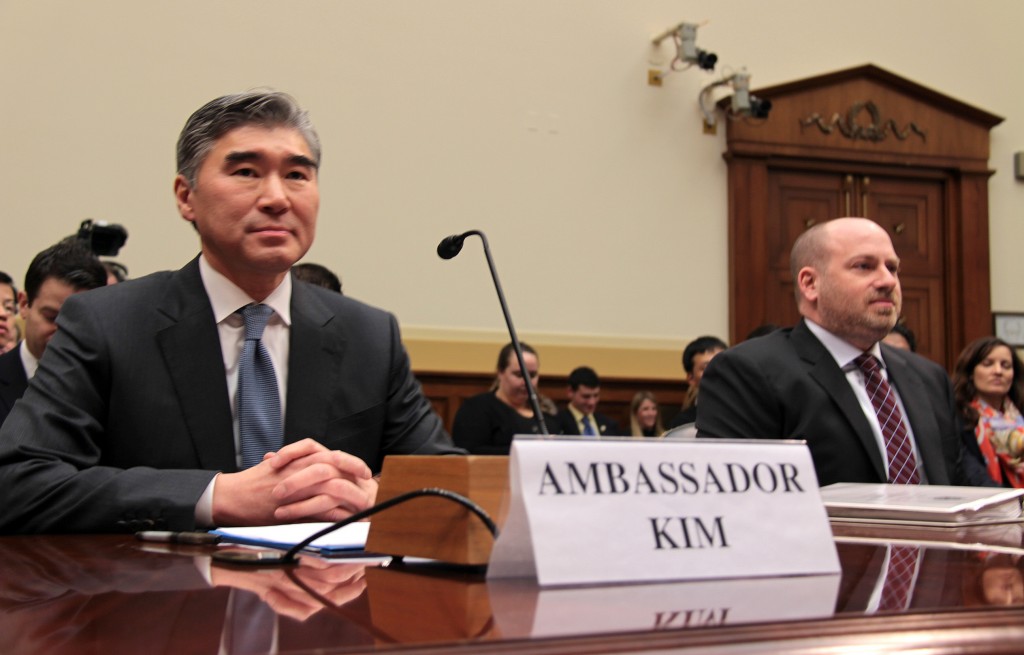
Amb. Sung Kim, left, special representative for North Korea policy, and Assistant Treasury Secretary for Terrorist Financing Daniel Glaser listen to questions during a House committee briefing. (Yonhap)
By Chang Jae-soon
WASHINGTON (Yonhap) — The United States will identify and impose sanctions on financial institutions doing business with North Korea so as to cut the communist nation off from the international financial system, a senior U.S. sanctions official said Tuesday.
Assistant Treasury Secretary for Terrorist Financing Daniel Glaser made the remark during a House committee briefing, saying the 2005 sanctions on the Banco Delta Asia (BDA), a bank in Macau, were so successful because it “created a chilling effect” throughout the international financial system.
“You said the goal is identify financial institutions outside of North Korea that provide these points of access (to the international financial system). That’s exactly what we’re trying to do,” Glaser said in response to a question from Rep. Ed Royce (R-CA), chairman of the House Foreign Affairs Committee.
Under the so-called “BDA sanctions” in 2005, the U.S. blacklisted the Macau bank, which not only froze North Korean money held in Banco Delta Asia (BDA) but also scared away other financial institutions from dealing with Pyongyang for fear they would also be blacklisted.
The measure is considered the most effective U.S. sanction yet on the North.
Early this month, the U.S. announced retaliatory sanctions in response to the North’s alleged cyber-attack on Sony Pictures, blacklisting three North Korean entities and 10 officials, including the Reconnaissance General Bureau, Pyongyang’s top spy agency.
Some analysts have claimed that the sanctions would only be symbolic because the communist nation has already been under an array of U.S. and international sanctions for its nuclear and missile programs as well as other provocative acts.
Glaser said, however, that the new measure is an “important new tool” because it gives the U.S. a “tremendous amount of flexibility in how we approach targeting” and allows for imposing sanctions against those who provide support for the blacklisted North Korean entities and officials.
“We could target any North Korean government agency. We could target any North Korean government official. And then once so targeted, we could apply sanctions with respect to any individual or entity who is providing them in turn material support, or any individual actually that they in turn control,” he said.
Also speaking at the House briefing, Amb. Sung Kim, special representative for North Korea policy, said the latest set of sanctions are aimed at increasing “the cost of North Korea’s misbehavior” and reducing “the revenues the DPRK (North Korea) is able to funnel to its illicit nuclear and ballistic missile programs.”
The new measure “gives us the ability in the future to designate those who provide material support to these designees,” Kim said.
The envoy said the U.S. is “using the full range of tools at our disposal to make clear to the DPRK that abandoning this course and abiding by international laws and obligations is the only way to end its political and economic isolation.”
The U.S. will make sure to “respond to the DPRK’s misbehavior” and “apply pressure both multilaterally and unilaterally” to increase the costs to the North of its destructive policy choices, Kim said.
Kim said he plans to travel to Tokyo for trilateral talks later this month with his Japanese and South Korean counterparts on how to deal with North Korea and resume the long-stalled six-party denuclearization talks. Kim said he also plans to visit China during the Asia trip.
North Korea has called for resuming the six-party talks without preconditions. But the U.S. and South Korea have demanded Pyongyang first take concrete steps demonstrating it would be serious about giving up its nuclear program if negotiations restart.
“While North Korea claims to seek talks without preconditions, it has consistently rebuffed or ignored our offers for dialogue and instead responded with a series of provocations, from last summer’s ballistic missile launches to November’s attack on Sony,” Kim said.
Kim stressed the U.S. is not insisting on North Korea to denuclearize before talks reopen.
The envoy also emphasized that there is “no daylight between Washington and Seoul on what we expect from North Korea” as the South seeks to test the North’s professed interest in improving inter-Korean relations.
South Korean President Park Geun-hye “made clear that major improvements in inter-Korean relations can come only with denuclearization,” Kim said, adding that the U.S. hopes the North will embrace Park’s “principled vision.”
“There are obviously issues between the two Koreas that need to be addressed but I’m hopeful that inter-Korean dialogue will support our overall efforts on denuclearization as well,” Kim told reporters after the House briefing.
Kim also rejected as nonsense Pyongyang’s recent offer to temporarily suspend nuclear tests in exchange for a halt to joint U.S.-South Korea military exercises.
“For them to offer to refrain from something that they should not be doing in the first place in return for our adjusting our routine defense-oriented, open exercise with the ROK (South Korea) makes absolutely no sense,” he said. “This is why that proposal is not accepted by us or partners in the region.”







